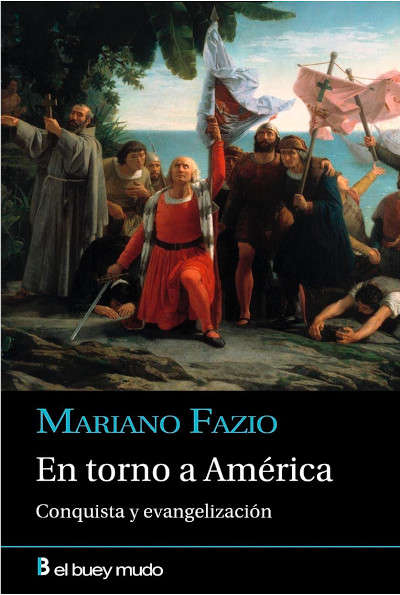In the picture
Cover of Mariano Fazio's book 'En torno a América. Conquest and evangelization' (Madrid: El buey mudo, 2023) 218 pages.
In the relationship between most of the countries of the Americas and Spain there is a common history that began with the arrival of the conquistadors and lasted for three hundred years. The evolution of cultural and political ideas in the last century has produced ups and downs in the conceptualization of that former Spanish presence in America by the national ruling classes, affecting their perception of the former metropolis, although in general a sustained diplomatic rapprochement has predominated, while episodes of estrangement have been few and far between.
Interested in the history of ideas, Argentine historian and priest Mariano Fazio tries to interpret in 'En torno a América. Conquest and evangelization' what were the mental parameters that gestated the Spanish colonization, and he does so by analyzing the ideas then in force. As he explains in his introduction, he starts from the writings of the chroniclers and historians of the Indies, as well as from letters and other personal documents of discoverers, conquerors and evangelizers of the time, especially from the 16th century, but also up to the 18th century: he takes into account the authors of the facts, but also their earliest critics (disregarding "a purpose" of later programs of study , because the goal is to see and understand with the eyes and mind of the moment). The book was first published a few years ago; now it has been updated and reissued with a new degree scroll.
The essay is divided into two parts. The first asks about the motivations that pushed the conquistadors to cross the Atlantic once America was "discovered", and the second, about the process of evangelization and inculturation carried out. As a man of the Church, it is normal that Fazio gives importance to the second aspect, but the conversion to Christianity and the influence of Christian anthropology in the organization of society are aspects core topic in the subsequent development that these peoples had.
Fazio highlights three motivations in the conquistadors: the search for riches, the Renaissance ethic of honor - to increase honor and leave fame behind - and the propagation of the faith. It has generally been understood that the goal of enrichment -the obsessive search for gold-, and also the search for fame, were the main incentives for the conquistadors to sail to the New World. But the sincere desire for the conversion of the natives should not be forgotten either. This purpose, Fazio points out, was not the first among the men-at-arms - but among the religious, who arrived expressly for evangelization -, but it played its role. In fact, these motivations were simultaneous: the apostolic zeal is intermingled "with greed and pride of all kinds subject"; in any case, when the desire for riches "was moderate, there was no incompatibility between these ends". "It would be ridiculous," warns the author, "to canonize the men-at-arms. Our attempt is to show that there really was such a concern and that in many cases it bore fruit". Thus, "there was a plurality of purposes that did not exclude each other, but rather complemented each other mutually in the soul of the conquerors". "Economic profit was decisive in driving the conquest enterprises. But it does not explain everything. There was a sincere eagerness to spread the faith, although it is logical to think that this interest was secondary in the men-at-arms," concludes the author.
Another thing is how this conversion was carried out, which the book addresses in its second part. Fazio leaves intact both the evangelizing work of the Church (with possible nuances that the synthetic nature of the work forces us to ignore) and the commitment of the Crown to the Christian conception of the human person. "The Crown of Castile sustained an official policy of high values that is unparalleled by any other in the history of European colonial expansion," he writes. However, he admits that "if the Church played a fundamental role in this awareness of the dignity of the human person, we must remember that it was a Church united to the State", so that it is in this instrumentation of the temporal order where most of the injustices were registered. They were committed by many conquerors and rulers, initially based on the legitimacy of violent conquest, if the Indians rejected a questionable formula of adherence to the faith, and later on institutions such as the encomienda. In these accusations, Fazio is quite right with Fray Bartolomé de las Casas, although he also disregards some of his excesses.
In his conclusion, Fazio makes a generally positive evaluation of the civilization that was born at that time. Without denying that the Spanish presence was at first the fruit of violence, he stresses that there was no cruelty and that many cultural elements of the pre-existing populations were able to develop in the new period, in a mestizaje that still astonishes today. "Miscegenation was made possible by Christian anthropology, which stresses the radical equality of all people. This does not imply, obviously, the absence of prejudice, discrimination and inequality," concludes Fazio, for whom the three centuries of the Hispanic period, "with its many lights and some shadows," constitute a heritage "transformed" by miscegenation.
En torno a América' is an attempt to overcome prejudices and approach the seminal era of Spain's relationship with America through the eyes of its protagonists, accepting that the mentality of the time is quite different from ours. "The certainty of possessing religious truth gave rights that today would be called into question thanks to a greater perception that reigns of the prerogatives of conscience," Fazio points out. The book deals with the convictions of the time, and the moral demands they entailed, as well as the criticisms that certain behaviors aroused even then.

